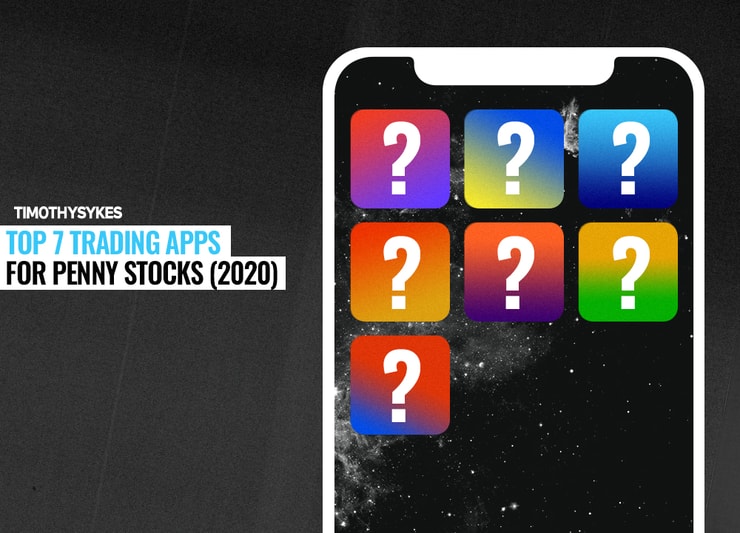What’s the best app for penny stocks?
I get this question often. Let’s face it. The tech available for trading penny stocks has changed a lot since I got in this niche 20+ years ago. An app for penny stocks back then wasn’t even a thing yet.
To say technology is changing super fast is a huge understatement. And that can help in our daily lives and in trading.
These days, most traders want to balance trading with the rest of their lives. Trading apps can seem like a good solution to help with this.
Some of you might think I hate trading apps. I don’t.
It’s true that I love what a powerful platform like StocksToTrade can give me on a laptop, and you should too. But that doesn’t mean you have to stare at a computer screen all day. Doing the hard work at home should give you more freedom to do what you love best.
(*Full disclosure: I proudly helped develop and design StocksToTrade. I’m an early investor in the platform.)
You need to find the tools work best for YOU. And luckily there are some good apps out there.
An app for trading penny stocks can be a great tool when used in the right way. Read on to learn about how to find the app for penny stocks that might fit your trading style and account size.
Table of Contents
What Are Penny Stocks?

Penny stocks are any stock that trades for less than $5 a share. They attract a lot of newbies because of that price point. But you can’t just pick any penny stock you have to know what to look for…
Like stocks trading at high volume and low float stocks. You also have to know a lot of these stocks fail — most penny stocks, in fact.
I don’t invest in these sketchy stocks. I trade them. It’s all about the patterns. There’s more to it, but I’ve been trading the same patterns for 20+ years.
Smart traders can learn to trade these patterns, too. I created my Trading Challenge to be the mentor I never had. My goal is to help my students learn the patterns I’ve learned so they can become self-sufficient traders.
I teach them to grow a small account by aiming for singles, not home runs. Small gains add up.
New to penny stocks? Get my FREE online guide here.
How Do You Buy Penny Stocks?
Trading penny stocks is technically easy. You need a broker account to execute trades and trading software to help you find trades that meet your criteria. (I trade with these brokers and these rules.)
If you’re looking for the ‘best’ trading app for penny stocks, you gotta know what’s gonna work best for you.
Penny stocks are largely out of the financial mainstream, which is why I love them. They’re not really covered by the mass media. It’s one reason the average trader doesn’t understand how to trade penny stocks.
There can be beautiful informational inefficiencies with penny stocks. Most people don’t know that.
This lack of mainstream attention also means that they aren’t the main focus of every trading app. You’ll need to do some research to find the right app for your penny stock needs.
But the real work is in…
How to Choose Hot Penny Stocks
How do you find the best penny stocks to buy for your strategy? Again, I gotta mention what I think is the best penny stock trading software out there, StocksToTrade. This is the software I helped design, and it’s everything I need for my research.
The trading apps I’m about to list can be good for when you’re researching or studying. But I think it’s smarter to trade on a robust platform.
There’s a reason I use StocksToTrade every day. Without the right scanner, you can miss a lot of stocks. StocksToTrade has more than 40 built-in scans. And you can customize them for your needs.
There was nothing like it when I started trading. StocksToTrade has all the scanners and tools you’ll need in one place. It has tools for paper trading, charting, watchlists, social media search, news, and more. Instead of having to go back and forth between different websites, I get all my research done here.
Wanna learn my process for building watchlists? Add my NO-COST weekly stock watchlist to your arsenal.
Top 7 Trading Apps for Penny Stocks

What’s the top app for penny stocks? That depends on what you’re looking for in a trading app.
Are you looking for a penny stockbroker with no minimum deposit? These days, that’s not hard to find. The real differences are more technical.
And they don’t advertise this stuff. Dancing babies and ads that show how ‘easy’ it is to make money trading … that seems to be more ‘important.’ The focus on fluff and unkeepable promises is one reason why most traders lose.
In this section, I’ll give you a rundown of some of the top trading apps out there.
Don’t be lured in by commission-free trades alone. Brokers will always find ways to keep making money…
One way they may do that is by routing your order through electronic trading firms that pay their commission. So to save a few bucks on a trade, you can risk getting a crappy execution. Not worth it, in my opinion.
Let’s look at the apps.
Charles Schwab
When Charles Schwab entered the world of trading apps, it brought a good reputation with it. That reputation wasn’t built on commission-free trades, although it now offers them. It was built on fast execution, ease of use, and a solid research backend.
Schwab’s platform StreetSmart Edge can be good for research. It’s also integrated with its mobile app. It doesn’t let you paper trade, and it’s got some stiff competition. But this app for penny stocks can be OK for newbies.
TradeStation
Did I mention hidden fees?
These won’t hurt you in the same way that a poor execution can. But they add up. Zero-commission trading seems like a good deal … Until you realize you’re paying a per-share cost.
In the case of TradeStation, the cost is variable. For most traders, it will be $0.01 per share. They guardrail it with a minimum charge of $1 and a maximum of $5.95.
It’s still cheap. But it’s still something to think about.
TradeStation offers an advanced trading platform, a decent app, and timely executions. For a fee, you can get access to Level 2 data.
More Breaking News
- Valterra Platinum Strengthens Position with Impressive Earnings Surge
- Credo Technology Stock Skyrockets After Impressive Fiscal Performance
- European Wax Center Signals Confidence with Financial Projections Boost
- Jumia Faces Market Headwinds Amid Rising Costs and Strategic Challenges
TD Ameritrade and Thinkorswim
I used to love Thinkorswim back before TD Ameritrade bought it. Back then, it had the best customer service, and it worked well for shorting.
That changed when TD Ameritrade bought it. And now that Schwab bought TD? It hasn’t changed anything yet, but who knows what might change.
Some of my top students have been known to use Thinkorswim, like Tim Lento.
It has free access to Level 2 data, customizable scanners, and solid executions.
But there are some things to think about before you start downloading. For one, it’s bad for shorting. And OTC data is delayed 15–20 minutes. If you’re a trader who relies on either, Thinkorswim won’t work for you.
The TD Ameritrade app isn’t great for shorting, but in other respects it’s solid. (I think shorting is overcrowded and dangerous these days anyway.)
TD is like other apps connected with established brokerages … It’s pretty user friendly, well integrated with TD Ameritrade’s website, and good on executions. I still use TD Ameritrade for penny stock trades.
Interactive Brokers
Now we’re getting to the deep end. This is another broker I use. It has solid executions and borrowing. Like most on this list, the app connects with desktop software.
Its variable fees range from $0.0005–$0.005 per share, capping off at 1% of trade value. Level 2 data is also an extra charge.
But it’s not all bad news. It can be an option for those who like to short stocks. It also has brokerage integration with StocksToTrade.
But with a $10,000 minimum initial deposit, it may not a great app for penny stocks if you’re a beginner or trading with a small account.
E-Trade
On this one, you probably shouldn’t trust my judgment. I mean, E-Trade has a great app, but it’s also a sentimental favorite. E-Trade is the brokerage I used when I made my first million. I’ve even stuck with them after a big snag with its desktop platform.
That doesn’t matter now that for charting I use StocksToTrade, which is also integrated with E-Trade.
For straight-up trading, I think is a good app for penny stocks. Even with E-Trade’s penny stock transaction fees, it’s still one I use often for buys. Shorting isn’t great with this option.
Fidelity
Fidelity is another in the Schwab and TD Ameritrade mold. Its app connects with a desktop platform. Execution is good, its stock catalog is vast, and its trade fees are cheap.
What I don’t like about Fidelity? It’s not a great app for penny stocks. In fact, this broker discourages penny stock trading. It’s geared toward ‘safer’ investments like mutual funds and retirement investments.
I may act like a retired trader, but I don’t wanna fall asleep while trading. Or wait for years for the kinds of profits I’ve made in 2020’s volatile market.
Robinhood
No matter how much I’d like to keep these guys off the list, I have to mention Robinhood.
Here’s the deal: you may save a little on commissions … But they can screw you with bad executions and lack of services. So you may save a few bucks on trading fees but miss out on profits.
I get it — they gamify trading. They’ve also brought a lot of new traders in. That’s great. Bring ‘em on. But don’t think for a second that it’s easy or that you can learn how to trade overnight.
You gotta work hard for it. It takes discipline, study, and experience. And then there’s the technology you’re using. If you want to take a shortcut like Robinhood, you can put yourself at a disadvantage.
But none of this should concern you. You can’t use Robinhood for penny stocks unless you only want to trade listed penny stocks.
Trading Challenge
Let’s get real for a second. None of these tools will help you if you’re making bad trades. Remember, most traders lose, and these apps only make it easier to do so.
How can you work to become a consistent trader? Learn the right skills and patterns — and STUDY. This is what you can do in my Trading Challenge.
Not quite ready for the Trading Challenge? OK — check out my 30-Day Trading Bootcamp. It’s where you can learn a solid trading foundation in one month of studying.
(Always remember: Most traders lose money. My top students and I have put in many years of hard work, experience, and dedication. Trading is inherently risky. Do your due diligence and never risk more than you can afford to lose.)
The Bottom Line: Which App for Penny Stocks Fits Your Needs?

If you’ve read this far and are still hoping I’ll make up your mind for you…
Here it is, in plain English: I can’t.
Over the years, I’ve used tons of different websites, tools, and brokers. It’s always an evolution. There’s no such thing as a perfect broker or trading app for penny stocks.
It’s just like finding your top trading strategy. It takes a lot of work, depends on your personal schedule, and I can’t do it for you.
What’s your top trading app for penny stocks? Let me know in the comments — I love to hear from all of my readers!




Leave a reply